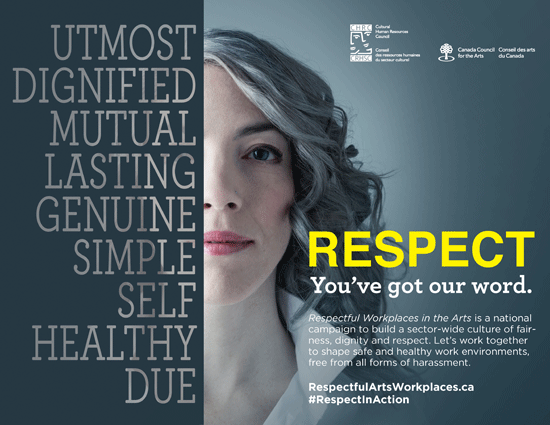Cultural Human Resources Council
NEWSLETTERS
 |
In this issue!
A very important undertaking of the Respectful Workplaces in the Arts project has been to develop a national Code of Conduct for the Performing Arts. Over many months and consultations, discussions and revisions, this Code was finally announced in the spring, and performing arts organizations across the country and the sector have been showing their commitment and support by signing onto it. The Code is a statement of expectations of artists and cultural workers for respectful workplaces in the arts; and of engagements by employers and Boards of Directors to provide safe and respectful workplaces, free of harassment. The Code sets the standard. Artists, cultural workers and employers are encouraged to sign on, and more importantly to undertake the development of their own codes of conduct together in their own workplaces. The process of developing a code together is more important than the words that finally end up on the paper! On official launch of the national Code of Conduct for the Performing Arts will take place during Culture Days.
Maintaining Respectful Workplaces (MRW) workshops are now being offered to artists, cultural workers, Boards of Directors and employers across the country, with generous funding support from the Department of Canadian Heritage. As explained in the last newsletter, selected trainers have received intensive training from HR experts on how to develop and deliver the workshops, drawing on the tools and resources created and collected at respectfulartsworkplaces.ca. They are now fanning out across the country in response to requests from arts organizations to host a workshop. The workshops are 3 hours in length and adapted to the audience, whether they be employers, workers, artists or a mixed group of 12 – 24 participants. Gathering sister organisations or members or clients for a workshop is strongly encouraged. If you are interested in hosting one of these workshops please contact Lucie D’Aoust at ldaoust@culturalhrc.ca. We are beginning to build up a schedule that will extend from September 2019 to March 2020.
We are delighted to announce that the promised RWA legislative webcasts for each province and territory are now online at respectfulartsworkplaces.ca. These informative webcasts have been created to assist cultural organizations with implementing and sustaining compliance with harassment legislation by province and territory. Topics covered include bullying, harassment, sexual harassment, receiving a complaint/awareness of an incident, and best practices for developing policies to minimize harassment risks in the workplace. Strategies are also explored for addressing harassment, e.g., complaint resolution process or investigation process. The webcasts are complemented by Quick Reference Guides for each province and territory which provide key compliance strategies and practical considerations to assist employers (including Boards of Directors and arts organizations) to meet their obligations and address workplace harassment issues as they arise.
With generous funding from the Department of Justice, CHRC has engaged well respected HR expert, Lise Labine, to develop a viable reporting system for cases of workplace harassment in the performing, literary and visual arts in Canada. It will be ready for implementation in both official languages in all provinces and territories except Quebec which already has a reporting mechanism in place. This is following up on a key recommendation from Jeanne Lesage’s report on Reporting and Investigating Mechanisms for Workplace Harassment in the Arts: Establish a confidential, independent third-party sector-wide resource for the complainants, respondents and witnesses of workplace harassment. Building on the valuable consultation and research of the Lesage report, and working with a Steering Committee of leaders in the visual, literary and performing arts, Lise will look at options such as the Haven Help line that has been established by ACTRA and the Directors Guild of Canada. By March 2020 we will have a “mechanism” that is costed and “ready to roll”, with funding recommendations.
Other key recommendations from the Lesage report relate to support for employers who are faced with cases of harassment in their organizations:
Can we handle this in house or should there be an external investigation? How can we handle the unexpected costs? Jeanne Lesage has been engaged, again with generous support from the Department of Justice, to undertake a feasibility study on these recommendations. Her report will be published in early 2020.
CHRC is proud of its third T2L cohort of mid-career leaders, drawn from Indigenous, equity seeking and official language minority communities, who have wrapped up their programme with their mentors and webinar learnings. They will go forward in their organizations and careers with a solid foundation in dealing with HR issues, a network of peers sharing their goals and ambitions, and with links to senior leaders through their mentors. In this third year of Talent to Lead we were able to hold regional gatherings across the country to bring present and past T2L participants together to discuss issues they are facing in leadership roles. How to handle diversity and inclusion emerged as a priority. In the coming weeks CHRC will publish a web report featuring the voices of our T2L participants and mentors as they discuss this and other challenges facing the sector today and going forward.
The long-awaited Labour Market Information Study of the Cultural Workforce 2019 (LMI), where so much of our energy and so many of our resources have been focused over the past year, will be released later in September. Project Manager, Grégoire Gagnon, will be crossing the country in a series of communications rollouts to introduce this very important document to the sector and to present some of the study’s major findings: for example, that some 800,000 artists and cultural workers work in the sector, and that its annual on the Canadian economy is $58 billion! Following a year of research and wide consultations (including a survey, focus groups and interviews) which CHRC conducted in collaboration with the Conference Board of Canada, the LMI report has 13 recommendations. They are directed at both the sector and government. Among the ones relating to “strengthening the cultural workforce” that have caught CHRC’s attention are the first three:
Arts Futures 2019: Immersive Technology as an Artistic Medium is a weeklong intensive virtual reality production program, presented by Interactive Ontario in partnership with CHRC, and with generous funding by the Canada Council for the Arts. Virtual and augmented reality offer tremendous potential for the creation of artistic works and narratives. Creation of successful work in these formats require the skills possessed by artists in a variety of disciplines – but the nature of the technology and large number of platforms and headsets don’t provide an intuitive entry point for many artists. This initiative seeks to assist artists in taking advantage of the opportunities immersive technologies offer. A call for applications for participation in this program will be issued later in September.
QAGGIAVUUT COMMENCES FEASIBILITY STUDYKEY STEP TOWARDS MAKING NUNAVUT'S FIRST CULTURAL HUB A REALITY
After 10 years of working to build a space for Inuit performing artists to create and present, Qaggiavuut commences a third-party feasibility study next week in Iqaluit. Consultants Savira Cultural Capital, based in Toronto, will work with Inuk Project Manager Kathleen Merritt over the next six months to determine the most feasible means to create space in Iqaluit for Inuit performing and visual arts, language and culture to flourish. The most important objective is the space to train and build performance skills," says Rhoda Ungalaq, Qaggiavuut's chairperson. "Our youth need a beacon of hope." Qaggiavuut is a non-profit charitable society with a mission to strengthen, promote, advocate and create space for Inuit performing artists. Nunavut is the only territory/province in Canada without a performing arts space. Qaggiavuut is spearheading a project to build Qaggiq: An Inuit Performing Arts & Cultural Learning Hub, a multi-purpose community gathering space and a campus for artists to build the skills they need to thrive on the world stage. This space is key to strengthening and preserving Inuit language culture and creating a stronger sense of community throughout Canada's north.
Many in the arts community fondly remembered Jocelyn Harvey at a celebration of her life in Ottawa on August 31. We at CHRC gratefully remember her strong support of our organization, especially in its fledgling years. In memory of her, donations are encouraged to the Jocelyn Harvey Legacy Fund to encourage public engagement, democratic renewal and critical public discourse.

Current Job Postings
CHRC members receive a 25% discount on job postings!
Executive Director: Susan Annis Project Managers: Lucie D'Aoust (Respectful Workplaces in the Arts and YCW) Finance Officer: Erma Barnett Webmaster: Michael Lechasseur A list of Board members can be found on CHRC's web site. |
|||||||||||||||||||||||||||||||||||||||
|
Cultural Human Resources Council (CHRC) |




